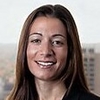Patent Claim and Specification Drafting and Prosecution
Avoiding Traps That Lead to Royalty Free Licensing of Patented Technology

Course Details
- smart_display Format
On-Demand
- signal_cellular_alt Difficulty Level
Intermediate
- work Practice Area
Patent
- event Date
Thursday, November 21, 2024
- schedule Time
1:00 p.m. ET./10:00 a.m. PT
- timer Program Length
90 minutes
-
This 90-minute webinar is eligible in most states for 1.5 CLE credits.
This CLE course will guide patent counsel on the impact of case law on daily U.S. patent practice. The panel will offer sound principles to prepare and prosecute patent applications to avoid traps for the unwary or careless claim terminology and untoward language in the specification. The panel will also give real world examples of "worst" practices that have led to the destruction of U.S. patent rights.
Faculty

Ms. Burgy focuses on opinion work, client counseling, patent prosecution and management, and litigation in the chemical, pharmaceutical, and biotechnology arts. She counsels her clients on a diverse range of patent issues. She assists clients on single-patent issues as well as complex matters involving multiple patents and applications requiring ongoing advice on patent portfolio strategy and development, with an eye towards litigation. She has assisted clients in the early stages of development through due diligence and patent portfolio analysis.

Mr. Irving has 47 years of experience in the field of IP law. His practice includes due diligence, patent prosecution, reissue and reexamination, patent interferences, and counseling, including prelitigation, Orange Book listings of patents covering FDA-approved drugs, and infringement and validity analysis in the chemical fields, as well as litigation. He has served as lead counsel in many patent interferences.

Mr. Gutowski focuses on client counseling, patent procurement, and patent enforcement. He advises clients on patent matters relating to infringement, validity, due diligence, and licensing. He also focuses his practice on strategic patent portfolio growth, management, and utilization. He has prepared and prosecuted patent applications to patent issuance and has significant experience in securing patent protection outside the U.S. He has developed vast experience in complex USPTO proceedings such as interferences, appeals, reissues, and reexaminations.

Ms. Kostiew is an experienced patent attorney with a demonstrated history of working in the consumer goods industry including beauty and personal care products and compositions (bars, liquids, sanitizers, shampoos, conditioners, etc.). She is skilled in Patent Prosecution, Freedom to Operate (FTO), Patent Portfolio Analysis, Patent Law, Technology Transfer, NDA/CDAs, and other aspects of Intellectual Property.
Description
Practitioners strive to secure valid and enforceable U.S. patent claims that will be construed to have the scope intended by the client, whether in litigation or before the PTAB. History reveals not infrequent royalty-free patent licensing resulting from mistakes in the claims or in the specification used to interpret the claims. Are these mistakes the result of carelessness? Of ignorance?
Some of these decisions have turned against the patent owner based on misusing some of the smallest and seemingly most innocuous of words, symbols, and expressions in the English language, such as "a."
Other times it is because the subject matter was disclosed but not claimed. Or the drafter did not remain vigilant about maintaining a tight priority chain in the specification. Phillips v. AWH Corp. (Fed. Cir. 2005) (en banc) emphasizes the specification at the heart of claim construction analysis. If fatal mistakes are made in the claims and specifications, it doesn't matter which standard the Examiner, PTAB, or the courts use to interpret the claims.
The more care a practitioner takes throughout prosecution--from telling the invention story in the initial drafting of the specification to the language of the claims to the winning arguments to the Examiner--the higher the likelihood that the patent will be construed as the patentee desires and will withstand any challenges.
Listen as our authoritative panel of patent attorneys discusses the impact of Federal Circuit and PTAB case law on your daily U.S. practice. The panel will offer best practices of fundamentally sound principles to prepare and prosecute a U.S. patent application to avoid traps for the unwary or careless claim terminology and untoward language in the specification. The panel will also reveal several real world examples of "worst" practices that have led to the destruction of U.S. patent rights.
Outline
- Impact of Federal Circuit and PTAB case law on daily U.S. patent practice
- Drafting claims
- Drafting specifications
- Litigating claims
- Defending against patent suits
- Licensing patents
- Evaluating the claims of third-party U.S. patents
- Best practices of fundamentally sound principles to prepare and prosecute a U.S. patent application
- Avoiding traps for the unwary
- Avoiding careless claim terminology and untoward language in the specification
- Real world examples of "worst" practices that have led to the destruction of U.S. patent rights
Benefits
The panel will review these and other high profile issues:
- How can a single word in claim language and specification lead to the demise of U.S. patent rights?
- How do Federal Circuit and PTAB decisions impact drafting claims and specifications?
- What steps can counsel take to avoid careless claim terminology and mistakes in the specification?
Related Courses

EU Design Law Changes: Navigating Revised Frameworks and Broadened Scope, Maximizing Protections
Monday, April 7, 2025
1:00 PM E.T.

Patent Inventorship: Best Practices for Determination and Correction
Friday, April 18, 2025
1:00 p.m. ET./10:00 a.m. PT